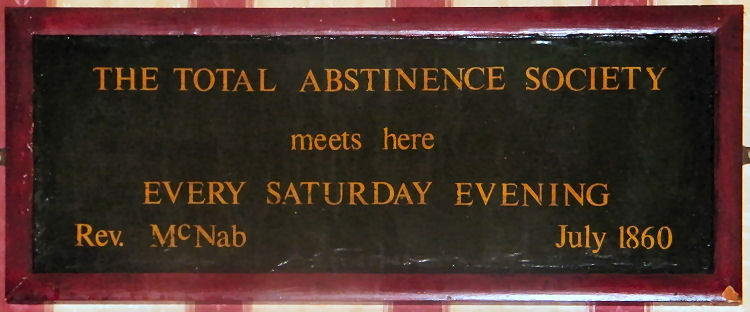|
Crabble Avenue
Dover
01304 206296
https://www.cricketersdover.co.uk
https://www.facebook.com/cricketersdover
https://whatpub.com/cricketers
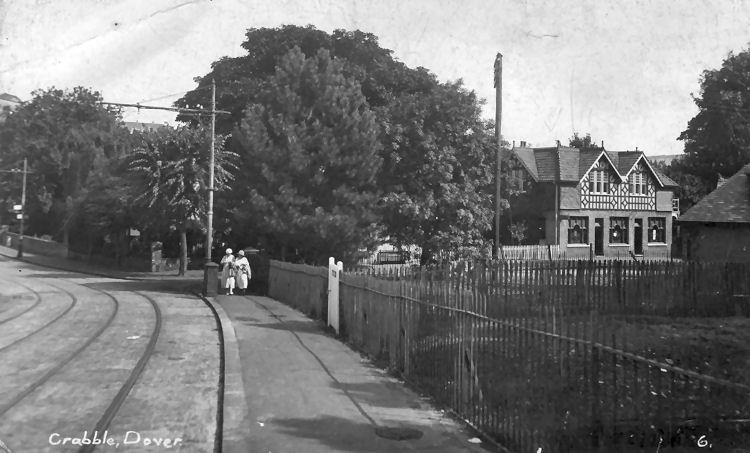
Above postcard, circa 1920. Kindly sent by Graham Butterworth. |
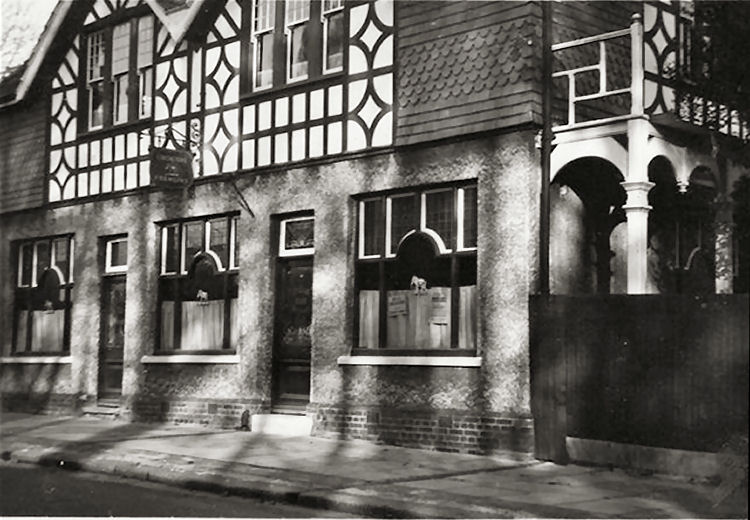
Above photo kindly sent by Janet Bambra showing the pub in the mid
1950s. |
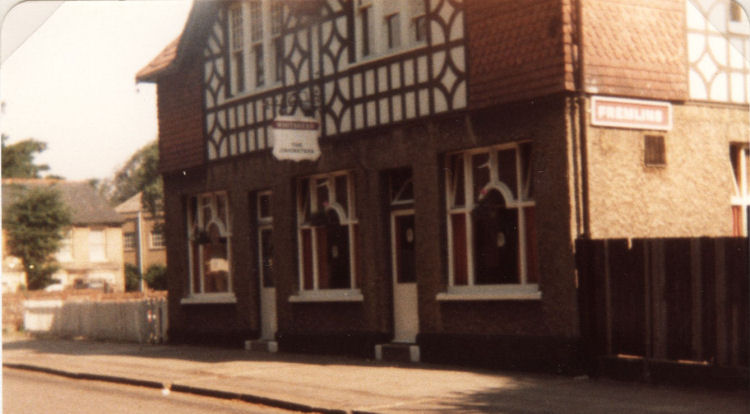 |
|
Cricketer Inn circa 1980 photo by Barry Smith |
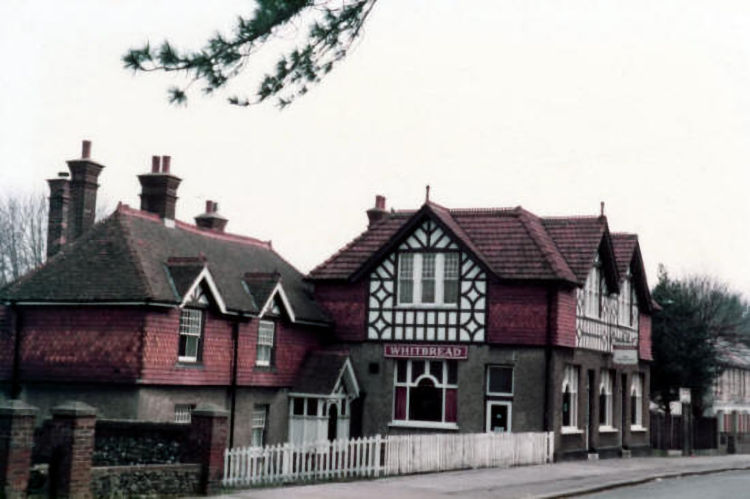
Above photo 1983. |
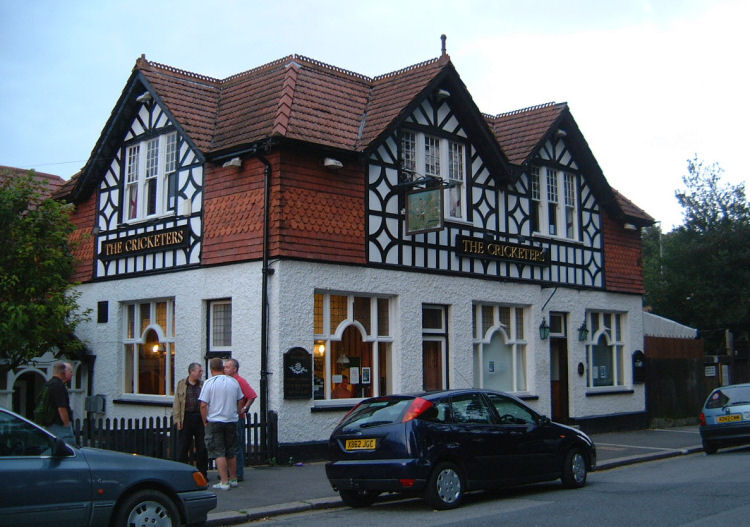 |
|
Photo above and below by Paul Skelton 8th Sept 2007 |
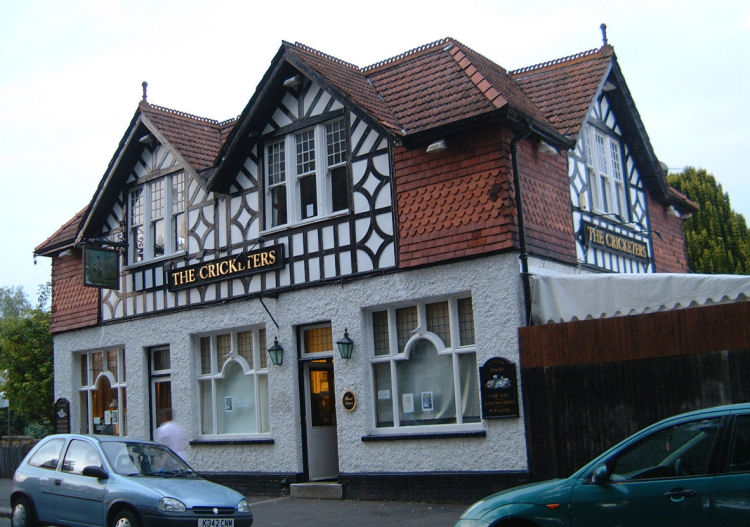 |
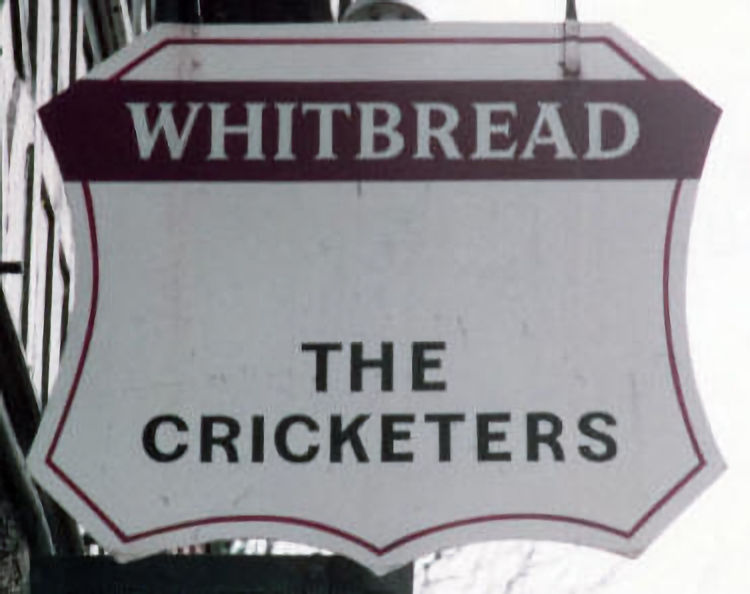
Above sign 1983. |
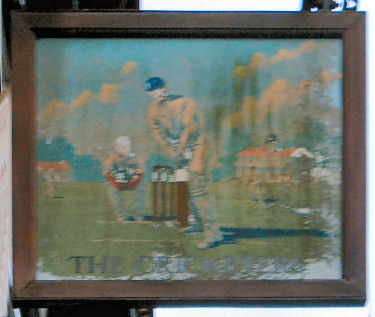 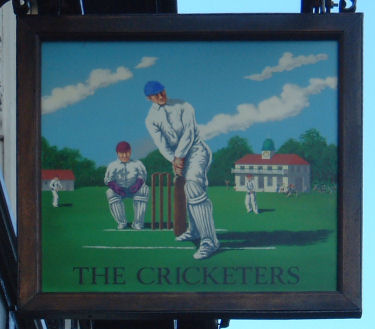
Left old dilapidated sign as seen 2007 and right as seen Oct 2009. |
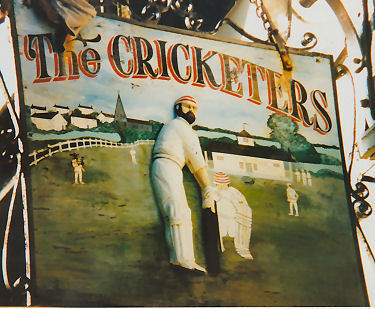
Cricketer's sign August 1991.
Above with thanks from Brian Curtis
www.innsignsociety.com |
Before The Cricketers was constructed there was a tin hut on the site
used by the Total Abstinence Society. A plaque is still mounted on the wall inside
the pub.
Supplied by Alfred Leney Co Ltd, who bought out Thomas Walker's Phoenix
Brewery in 1859 and registered as such in 1896, until bought out by Fremlin
Brothers brewery of Maidstone in 1926, brewing at the Dover brewery ceased
in 1927.
According to the current landlord, Graham Bodell, The Cricketers was
constructed in 1887 for George Leney but it was not until 1892 that it was
first used as a pub. This is actually before the athletic ground was laid,
so the name Cricketer was either planned in advance or may have had a
different name at the time. If so, I haven't traced it yet.
In 1896 a syndicate consisting of Messrs Hayward, Finnis, Stillwell and
brewer, Alfred. C. Leney, purchased 14 acres of grazing land known as
Crabble Meadows which extended from the back of Bunkers Hill at the back of
Dover. The eight acres to the north of the plot was steeply sloping land and
on this ground Mr Leney, decided that cricket should be played. The
levelling was a very costly project; it nearly wrecked the syndicate
financially but they did achieve their aim and Mr George Wyndham, M.P., was
able to open the ground on Whit Monday 1897.
The same year, Leney applied for a licence for a house which his company
proposed to reconstruct and enlarge, at a provisional cost of £1,200. It is
this house we see today.
Upstairs there were 6 letting bedrooms and the building was known as "The
Cricketers Hotel". In the upstairs function room you can still see the gas
pipes used for lighting the six rooms.
It would be called appropriately "The Cricketer's Arms" and if necessary
the brewer agreed to surrender the "London Packet". On that basis, George
Holly was allowed to draw in August 1897. Utilised as a hotel for some part
of its life but to-day (1980) serving Fremlin and Whitbread with a shorter title.
|
From the Dover Express and East Kent News, Friday, 27 April, 1900. Price 1d.
DONKEY THEFT
Thomas Egan, and another boy, O.Callagan, were charged with throwing
stones, to the public danger, in Archcliff Fort Road. Egan was further
charged with failing to appear to the summons and further with stealing
on the 19th inst. a gelding donkey, value £5, with a set of harness, and
also with stealing a set of harness, value £2 from the “Cricketer's
Arms.”
Police Constable Lawrence's evidence in reference to the stone throwing
on Friday was read over.
The case against Egan for stealing was then gone into.
Edward West, greengrocer, 7, Peter Street, said he owned a donkey, and
kept it in a stable in Peter Street. The door was fastened with a
padlock, but as witness had lost the key, the padlock was only closed.
On Thursday evening witness fed the donkey, and left it for the night
about 9 o'clock. About 7 o'clock the next morning he went to the stable
again, and found the donkey gone. The collar, harness, and traces were
gone, but in the stable he found a collar, harness, and traces which did
not belong to witness, and which were not there the night before. He at
once gave information to the Police, and the donkey and the harness was
taken back to the stable by the Police on Saturday afternoon. The value
of the donkey and harness was £5.
Mrs. Florence Smith said she lived by the stable, and the opening
leading to the stable was next door. On Thursday evening between 9.30
and 10 she was standing at her door. The prisoner came out of the
opening leading a donkey with its harness on. She knew the prisoner by
sight, and thought it was all right.
Police Constable Southey said on Friday evening he proceeded to
Sandwich, and there found the prisoner detained at the Police Station.
Witness made enquiries there, and went to Felderland Farm in the parish
of Worth, and in a shed at the rear of the farm building he found a
donkey and harness. The farmer did not know it was there, it being the
first time that he had seen it. Witness took the donkey to Sandwich and
pounded it. He then saw the prisoner, and told him that he would be
arrested for failing to appear to a summons , and further charged him
with stealing from a shed at the rear of High Street, Dover, a donkey
and harness. He made no reply. He was detained there for the night. They
the next morning went to the stable, and the ostler said the harness was
too big for the donkey, and witness asked the prisoner how he became
possessed with the harness. He said, “I picked it up about 12 months ago
in a field at Worth.” Witness asked him what he had done with it all
that time. “he said he had hid it in a sack in a hedge at Worth, and
about three weeks ago he brought it over to Dover and hid it at Barton.
He brought the donkey over to Dover by road, making the prisoner lead it
all the way. At the Police Station, from what he was told, he showed the
prisoner a harness which was at the Police Station, and asked him if
that was the remains of the harness that he had picked up, and the
prisoner said, “Yes.” Witness told him he would be further charged with
stealing a set of harness from the “Cricketer's Arms,” Crabble.
The prisoner pleaded guilty, and his mother, who said his proper name
was Tom Longe, asked that he should be sent away for some years. He was
rather dull, and was only in the second standard at school.
The Chairman of the Magistrates said that Egan had twice before been
charged. Once he was allowed to go, and on the second occasion he
received six strokes with the birch rod. He would now receive nine
strokes with the birch rod and be sent to a reformatory for three years.
The case in reference to the “Cricketer's Arms” was not gone into, not
was Egan dealt with for the stone throwing.
In reference to the summons for stone throwing against O'Callagan, a
Quarternmaster-Sergeant stated that 64 panes of glass had been broken,
and damage to the extent of £1 2s. done.
The boy's defence was that the damage was done before they threw stones.
A fine of 10s. was inflicted on O'Callagan.
|
|
From the Dover Express and East Kent News, Friday 19 April, 1907. Price 1d.
PUBLIC HOUSE CHANGES
The licence of the “Red Lion” at St. Peter's was transferred from Mr. F.
W. Summers who until recently was the landlord of the “Cricketer's
Arms,” Crabble.
|
|
Dover Express 30th July 1909.
The landlord of the “Cricketers’ Arms”, Crabble, was granted permission
to use his premises for a wedding party till 12 midnight to-day, it
being stated that the guests would not be served intoxicants.
|
|
Dover Express, Friday 3 February 1950.
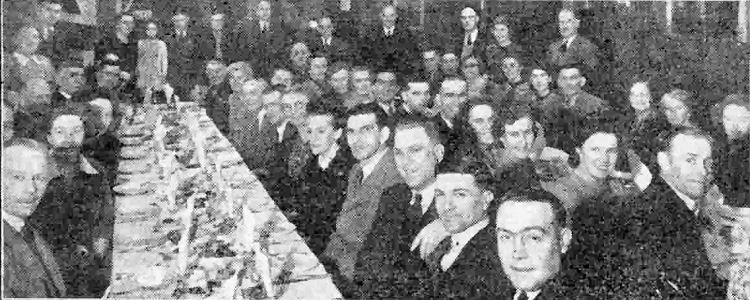
Fifty-four members and friends of the Men's and Ladies' Darts Club of
the "Cricketer's Hotel" at a combined supper and social at the hotel on
Saturday. |
|
From an email received 17 Jan 2011.
I was born in the
"Cricketer's Hotel" in 1944.
My father Jonas M Bambra was the licensee there from 1940 until 1966.
After his time as licensee he went back into the building trade as a
plasterer for a small Folkestone company and died a year later (April 1967).
I remember meeting his successor, Jack Moseley, while visiting the pub prior
to taking up the tenancy.
I left England for good in August 1968, just over a year after my
father's death and now live in new Zealand.
Incidentally, the previous licensee, Arthur Humphrey, was my grandfather
(my mother's step-father – he had spent some years on the staff of the Duke
of York's Royal Military School up past the castle before taking on the pub
– my parents would visit them at the "Cricketers," cycling through the night
from Sidcup/Bexley area for weekends! So when my father, always called Joe, took over
the tenancy, they were well known by the regular customers.
My mother (Claudine - always known as Claudie or Mrs. B) was very proud of her “ladies' darts team”. I think
I am probably the young girl standing at the end of the left hand table in
the 1950 photo – I quite often used to be a spectator at these socials while
my mother helped run the bar they would set up on trestle tables. My bedroom
was down a very short flight of internal stairs and I learnt from a young
age to sleep through the sound of the dance bands!
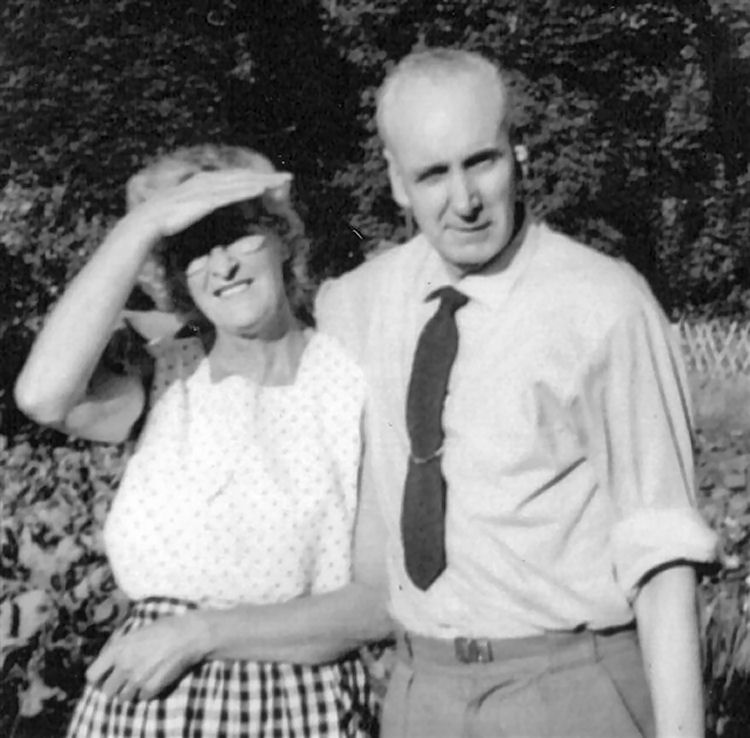
Photograph above showing Claudie and Joe Bambra 1962.
My mother would occasionally cater for “cricket teas” after a Saturday
game and occasionally catered for weddings.
With five bedrooms in the adjoining house, we would often take in
boarders from the Wiggins Teape paper mill at Buckland – either trainee
managers (the Buckland Mill trained a lot of staff for their other mills in
the UK, management staff being transferred to the Buckland Mill from other
parts of the country - on two occasions that I recall the wife and children
stayed with us – until they arranged their own homes.
When Wiggins Teape sent staff to run a new paper mill being set up in
Australia in the mid 1950s, these men also boarded with us for a number of
weeks. Once we had five – three in one room (double bed plus single bed) and
two sharing another room! – post-war and heading en-route to a new land of
opportunity they did not complain! They lived as family members and enjoyed
socialising “behind the bar” in the evenings.
Until the early 1960s our garden extended to No. 1 St Andrews Terrace.
Part of this was used as a bowling green until the early 1950s. The brewery
sold off that land in very early 1960s and the pair of semi-detached houses
was built. I remember seeing people play bowls when I was very young –
probably 1947.
The advent of television with its New Year's Eve programmes, made a
drastic reduction to our trade – on one New Year's Eve in early 1960s we had
less than 10 customers – in previous years N.Y. eves were very boisterous!
Still, it's good to see (from their website) that the Cricketers (it was
called the "Cricketers Hotel" when I lived there) has survived and seems to
be thriving when I see from websites that many other Dover pubs have closed.
Life, society and interests change over generations.
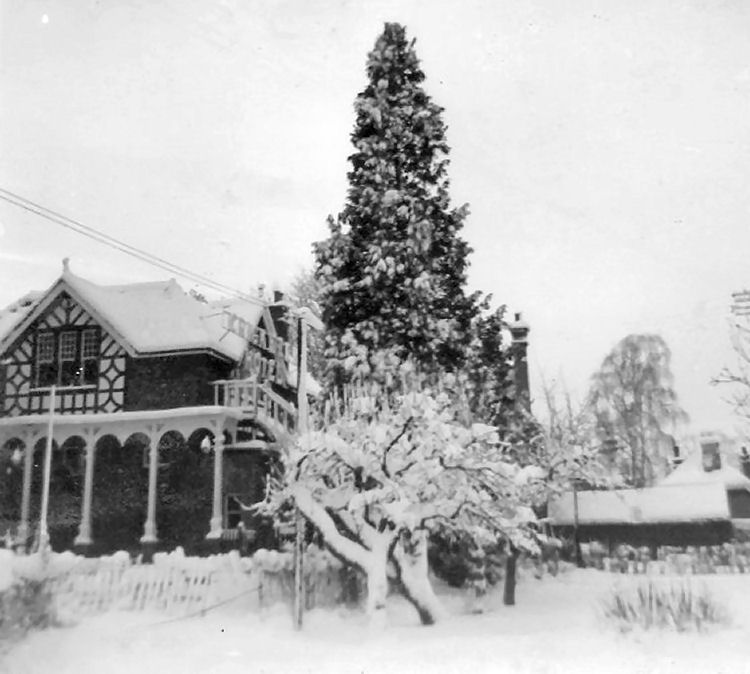
The photo above shows the rear of the pub in January 1958. The large
lettering Cricketers Hotel could be seen by train passengers on the
railway line behind the pub (which was still called the “Cricketers
Hotel” when our family left in 1966). It was
taken from the old “bowling green” (now the rear of the neighbouring
semi-detached houses). Public access to the upstairs function room was
via the wooden staircase. The ladies/toilet was accessed from outside
only, beneath the staircase (small window can be seen). To access their
toilet, men had to walk along the front footpath then down the driveway
as the toilet was located in the rear corner of the house!). The veranda
roof had a bench seat beneath overlooking a sealed outside seating area.
The fence to the left of the fruit trees kept the public from our huge
private garden area which included a vast vegetable garden, large
chicken run, fruit trees and currant bushes.
As a child I was told that while the pub was around 100 years old,
the adjoining house was originally a farm house and was about 300 years
old. Because of the house layout (including two staircases!), I've often
suspected some rooms were added at the time the pub itself was built on.
Your site says "Upstairs there were 6 letting bedrooms and the
building was known as "The Cricketers Hotel". In the upstairs function
room you can still see the gas pipes used for lighting the six rooms."
This rather interests me – I'd never heard this so it must have been
before my grandparents' tenancy – in 1940s, 50s and 60s there were two
large gas light fittings this shape: ┴ suspended from the ceiling in the
centre of the room with an upward facing nozzle at each end (I once saw
a man lift his very small child up to swing on one!) so they were
probably about 7 or 8 feet off the ground). I think there were some
small fittings on at least a couple of the walls, and I'm sure one
“standard size” fireplace on the rear, long wall at the house end, but
with the location and size of the windows I can't see how it could have
been divided into six rooms unless it was by partitions giving only a
semblance of privacy. The half flight of stairs down into the house led
into one of the “private” bedrooms.
Perhaps at that time the only access was in fact from the house which
had 5 upstairs rooms plus a bathroom/toilet which was above the men's
toilet in the rear (River end) of the house – this has always struck me
as rather a strange layout – perhaps that was another (6th) bedroom at
the time of adding the pub on (it's in what I always felt was the older
part of the house). Probably any original toilet facilities for the old
house would have been in the rear, attached “outbuilding” (seen in the
photo above). There was no plumbing in this function room in the Bambra
tenancy (to 1966). So where might “toilet facilities” for these guests
have been located? Perhaps buckets at end of 19th century?? There was a
header tank (to supply the radiator system which would, I suspect, have
been installed many years after the room was built) at the Buckland end
and if the radiator system boiled dry my father had to carry buckets of
water all the way from the house kitchen, via the bedroom, to fill this
header tank. There was only a cold water supply into the bar until at
least the mid 1950s, hot water being brought in from the house kitchen
in a large bucket to wash the glasses – there was
a copper sink with draining surface either side, beneath the counter.
Glasses and plates were lowered from the function room down to the bar
in the dumb waiter (which we called the lift) for washing. In the mid to
late 1950s a small hot water cylinder was installed beneath one of the
draining benches (possibly to satisfy some new hygiene regulations??).
Janet Bambra
New Zealand
|
|
FURTHER RECOLLECTIONS FROM MY EARLY LIFE AT THE CRICKETERS.
Lockable garages in two shed-type buildings were located at the bottom of the
driveway (at the Crabble Road end of the property). These were rented
out. The right hand building also contained two stables each with two
stalls. In the years between (about) 1957 and mid 1960s, one of these
stables was rented out to Fred Hammond who had a horse-drawn
greengrocery round in River and Crabble. He also rented one of the
garages for the cart. Water for the horse and for washing of cars had to
be hauled from the river using a bucket and rope. While writing this in
January 2011, I was intrigued to see on Google Maps that the stable
building was still there and still had the lean-to chicken shed attached
inside the garden! This chicken house continued down the rear wall of
the stable/garage building with another chicken house attached further
towards the river. There were fruit trees within the chicken enclosure.
A tiny cottage standing on the other side of our driveway was owned by
the brewery until at least 1966. With two bedrooms, an outside toilet
and no bathroom, it housed one of the delivery men, his wife and son
(and two large horse chestnut trees inside the front wall) this building has now been very much enlarged.
The brick cottage on the opposite corner was, until at least 1966, a
public toilet for the cricket ground!
When my grandparents took over the pub in 1929 the pub was divided into
three separate bars each with its own entrance door and separated by
high, wood partitions. According to my mother, at that time the lower
half of the windows were covered by wooden screens on the inside. These
were replaced by curtains which gave privacy while letting the light
through. Each entrance door from the footpath opened into a “box”
enclosure about 2m (7 feet) high with a self closing “push” door opening
into the bar. This would keep wind and rain out of the bar. The large
public bar was created by removing the partition at the Dover end. The
small bar at the River end, the Saloon Bar, attracted more sedate
customers. While the bench seating on some walls in the public bar was
flat, varnished timber, the bench seating against the saloon bar walls
was padded and covered in black “leatherette” and the chairs were more
comfortable. The door from just inside the front garden gate opened
directly into the Saloon Bar. I don't know how the main bars were named
before the partition was removed. The counter was continuous and served
both bars. A hinged portion of the counter at each end could be lowered
at busy times (supported by a low door) and this would totally enclose
the serving area. I don't remember there ever being a “picture” hanging
sign outside.
Spittoons were still in use in the pubic bar until at least 1928 – I
remember my mother telling me “he got rid of them when he took over” but
cannot remember whether “he” was my grandfather or my father. I don't
recall any mention of sawdust!
The back of the bar was mirrored with glass shelves where Cigarettes
and tobacco were stacked, also spirit glasses, wine glasses (used for
spirits with soft drink mixers.) Wine was not sold. Beer glasses,
bottled beers and soft drinks were stored on open shelves beneath the
bar counter. No bar fridges then!
There was a small fireplace behind the bar, next to the dumb waiter with
a wide shelf and enormous, ornately framed Victorian mirror on the wall
above (a similar mirror was in the saloon bar). A central heating system
heated the bar (and possibly the upstairs function room) driven by a
coke-fired boiler located in what was called the “smoke-room” leading
off from the saloon bar (this room would have been where “gentlemen”
from the saloon bar would go to smoke in earlier years). The header tank
for the system was in the upstairs function room and if the coke boiler
was allowed to overheat the water would evaporate via the header tank.
It then had to be topped up quickly with cold water carried in buckets
from the house kitchen (the only place a bucket would fit beneath a
tap). The central heating system may well have been installed at the
time the pub and function room were built.
Behind the bar, there was a disused box with hinged numbers visible
through the glass font. My mother told me these were originally
connected to push buttons in the bedrooms (I recall a disused bell-push
in one of the private bedrooms). However, if there were originally
“lodging rooms” in what is now the function room, they may have been
connected to them.
The toilet facilities were fairly spartan though they might have been
considered “state of the art” at the start of 20th century!! Proper
toilet paper was not provided as it was always stolen so squares of
newspaper strung onto string were hung on the wall! The ladies toilet
had an interior light and a hand basin with a cold tap set into a marble
shelf but I never saw soap or towel – same reason I guess. The men's
toilet, located in the far corner of the house and down the side
driveway only had an outside light above the entrance. There was no
automatic flushing system and it would be mopped out and disinfectant
used each morning!
Until about 1950 bowls was played on part of the large lawn (which is
now the rear gardens of the semi-detached houses next door - the brewery
having sold that land in about 1959). With no more bowls and my father
tired of mowing it, we kept geese there for a few years until a fox
killed them all and left the bodies up on the railway embankment.
The outside seating area (with imitation wrought iron and marble topped
tables) with bushes and trees on two sides, was accessed through a gate
in the front fence, in the same place as the present gate (though it was
not signposted at all!) and was very popular in summer with family
groups. The large private garden was visible but fenced off by a wooden
snow fence. Until the mid 60s large numbers of people walked past the
house at Sunday tea time, returning from an afternoon walk to River, and
many stopped for drinks in the outside area. Imagine how nice it would
have been in the war years with two hours daylight saving!
There were two dartboards in the public bar (I don't believe the darts
club operated much after the mid 1950s) and in the mid 1950s a bar
billiards table was installed in the centre of the public bar. Cribbage
and dominos were played. There was a piano in the public bar and in the
very early 1950s my mother had a piano accordion which she sometimes
played in the bar. For “entertainment” a radio (and later a radiogram
with 78 rpm records) was behind the bar. I don't remember hearing of any
“organised” live music being played in the bars.
The old gaslight fittings were still in place on the pub walls while we
lived there. I saw them used once, during a power cut (possibly in mid
1950s). Once your eyes adjusted, the light wasn't too bad.
A very popular “News of the World weekly draw” operated - customers
would pay to draw a disc from a bag. Each disc had a letter on it (X, Y, Z
were all on one disc) and their name was recorded alongside their letter
in a book. The first letter of the large headline of the News of the
World Sunday paper determined the winner, who I think received most of
the money as a prize (some of the money may have gone into the Christmas
club fund but it all went back to the customers one way or another). If
the headline started with a number then the XYZ disc was the winner.
A Christmas Club operated – on “club night” customers paid money to my
mother who recorded it in a book. A week or so before Christmas the
money was returned to each customer in an envelope (plus a little
interest I think) and at Christmas the bars would be hung with old-style
paper chains and other decorations.
My mother always made and iced a Christmas cake for a Christmas raffle
plus a home-made Christmas pudding (her grandmother's recipe).
Potato crisps (unsalted, but with a waxed paper screw of salt in every
bag) and little packets of salted peanuts were for sale. In the 1960s
more pre-packaged items became available such as tiger nuts and cracker
biscuits with cheese filling. Home-made pickled eggs were very popular
and sandwiches could be made on request at lunch times by my mother.
Fillings were cheese or whatever else might be in the family fridge! We
also sold little boxes of “Koray” pain killer tablets (our doctor hadn't
even heard of these!) and later sold bars of chocolate.
The weekly beer deliveries (after the morning session had closed) were
put into the stone-lined cellar via a small pair of double doors and
trapdoor just before the porch of the house. Wooden barrels of various
sizes were slid down a concave wooden ladder which had steel runners,
steadied by special hooks on ropes (no metal kegs in those days). Crates
of bottles went in the same way. The draymen (as the men were called – a
hang over from the much earlier days of horse-drawn drays) were then
entertained in the saloon bar by my father and given free beer for an
hour or so!
Up to the 1950s, a “casual” woman helper sometimes worked in the bar in
the evenings (probably Saturdays) and assisted at socials, weddings etc.
(which my mother would cater for) in the function room but with trade
slowing down in the 1960s my parents managed on their own with
occasional help from me and my brother if we were home. I don't think we
had any wedding receptions after 1960. While the pub opened at 6 pm
(except Sundays), the regular customers did not usually come in until
7.30 or 8 pm.
Only two types of draught beer were sold – “beer” and “bitter”. It was
in un-pressurised wooden barrels and pumped from the barrels in the
cellar using the old hand pumps which were fixed on the counter. Other
types (brown ale, light ale, stout and Guinness) were sold in bottles
which contained slightly more than half a pint – for these we used
“bottle glasses” which did not have to be a legal measure. Lager became
very popular in later years particularly as “lager & lime” - with an added
dash of lime cordial. Schweppes Bitter Lemon, introduced in 1957 quickly
became a favourite with the ladies, (it was seen as a more sophisticated
soft drink) as did Babycham.
Occasionally a coach load of people would arrive unannounced in the
early evening. Reinforcements (my mother and perhaps my brother or
myself when we were old enough) would be called for by a push-button
electric bell which rang in the house. Pandemonium for half an hour then
back to normal (waiting for the regulars to come in).
During World War 2, a large number of soldiers were stationed in the
area and formed a very large portion of the pub's trade. They were
stationed at the large house which stood behind a high wall and double
gates on the opposite river bank (called “Called” Crabble Conference House when
I lived there), and also at “Toop's Farm” which was on the left corner
of Lower Road and Crabble Lane (the farm land then extended on the right
side of Crabble Lane at least to what is now Deanwood Road with the cows
being walked down to the farm for milking – a great attraction on our
way home from River School in the 1950s!). My mother told me that air
raid warnings were pretty much ignored and closing times were often
difficult to enforce (I believe only one shell fell half way along
Crabble Avenue but no bombs). One night, with the bars bursting at the
seams well after closing time and my father getting worried about losing
his licence, a policeman put his head around the door, saw the situation
and called across to my father “OK Landlord, keep going!”
Wartime
Christmas and New Years always filled the bars to capacity – apparently
one New Year's Eve someone even brought a horse into the bar – quite a
feat considering the double door system!
In the war my parents had a black Labrador dog called Roger who loved
spending time with the soldiers. Some of them told my mother that Roger
would frequently spend nights in the guardhouse at the farm – they would
sleep all night and could rely on Roger waking them up with his barking
if anyone approached! He would sometimes bring large cuts of meat home
in his mouth from the army cookhouse and with severe food rationing in
force, my mother would scrub them and cook them!. Stolen or gifted –
nobody asked!
When I was about 4, my father took me into the bar one morning to see a
ferret that one of the regulars had inside his shirt! My mother was not
impressed. I think he used it for hunting rabbits on the hill behind
Hillside Road.
Closing time was quite rigid and people not watching the clock could be
caught with a new order, when my father called time, resulting in it
having to be drunk quickly. Later the licensing laws were amended (very
late 1950s or early 1960s?), to provide an official 10 minutes “drinking
up time” at the end of each session.
In the 1950s it was becoming difficult to get a good head on the beer
and short rubber tubes with flattened metal nozzles were introduced and
pushed onto the beer pump spouts. The beer was then literally squirted
into the glasses to encourage a good head.
Until late 1950s/early 60s the legal measure of pint and half pint
glasses and mugs were to the very top and the frothy head stood above the
rim of the glass. New, larger, glasses became available with the legal
measure marked on the glass about ¾ inch from the rim. At first customers
thought they were being given short measure but it meant a good head
could be on the beer without spillage. In the late 1950s, my father
added a more personal touch by painting our regular customers' names on
their usual glass.
Generally the men came in alone during the week but were sometimes
accompanied by their wives at weekends. The men were always called by
their first names (even by us as young children) whereas many of the
wives were called Mrs……, even by my parents.
In the 1960s the occasional casual customer would complain about the
warmth of the beer. Ice cubes would then be obtained from the family
fridge. My father suspected these customers were visiting or returning
from countries where ice-cold beer was standard.
The annual County Cricket Weeks were good for trade. When Yorkshire
played Kent (1961) Fred Truman, the famous fast bowler, came into the
public bar one evening with some team-mates.
Saturdays in soccer season usually brought additional trade before the
match as the bus stop was then almost opposite Lower Road. Occasionally
a band would play during the interval – often the Dover Sea Cadets Band
In 1960 the match against Peterborough (known as “The Posh”) brought a
large number of their supporters into the pub before the match. The bars
were jam packed and after they left we found lots of little blue
stickers saying “Up the Posh” stuck on walls, doors, windows etc.
In the 1960s, our Staffordshire bull terrier, Chum, who usually spent
most of the evening with my mother behind the bar, always amused the
customers at closing time. As soon a my father called his distinctive
“Tye-eeeeeeeeem please!” Chum would put his head back and howl. And howl
and howl! (of course, he'd actually learnt that “time please” meant
supper was about to happen!)
Even in the 1960s most town pubs depended on local or regular customers
and simply waited for customers to come to them. But times have a habit
of changing! With so many pub closures it's good to see that the
Cricketers has not only survived but has been turned into a modern pub
with the ability to host different types of functions and boasting
several sporting teams. As my much loved home until I was 22, I have
many fond memories of it 40+ years on.
Janet Bambra
New Zealand
29 January 2011
|
|
From the Dover Express and East Kent News, 9 October, 1908.
DOVER POLICE COURT
(Before Matthew Pepper, and G. C. Rubie, Esqrs., and Capt. Gay.)
LICENSING BUSINESS:- The landlord of the "Cricketers' Inn," Crabble,
applied for an occasional licence in respect of a farm sale there on
Wednesday.
The Chairman: You take the liquor to the sale, I suppose? - Yes.
Do the people have it before they bid or after? - Inbetween bidding.
The licence was granted.
|
|
From the Dover Express and East Kent News, Friday 10 April, 1925. Price 1½d.
LICENSING BUSINESS
Mr. G. P. Wood, of the “Cricketer's” Hotel, was granted permission to
supply refreshments at the Town Hall on 15th April for the Mayoress'
dance.
|
|
From the Dover Express and East Kent News, Friday, 17
February, 1933. Price 1½d.
LICENSING EXTENSIONS
Mr. Humphreys, "Cricketer's Hotel" was granted an extension of the annual
dinner, River Old Boys, on February 18th.
|
|
From the Dover Express and East Kent News, Friday, 4 August, 1933. Price 1½d.
LICENSING BUSINESS
Extensions were granted to Mr. Humphreys, licensee of the "Cricketers
Arms" for each day of the Dover Cricket Week.
|
|
Dover Express 20th June 1947.
Town, Port & Garrison.
Dover Magistrates, on Friday, granted an application for internal structural
alterations to be carried out at the Cricketers’ Hotel, Crabble.
|
|
From the Dover Express, 17 February 1950.
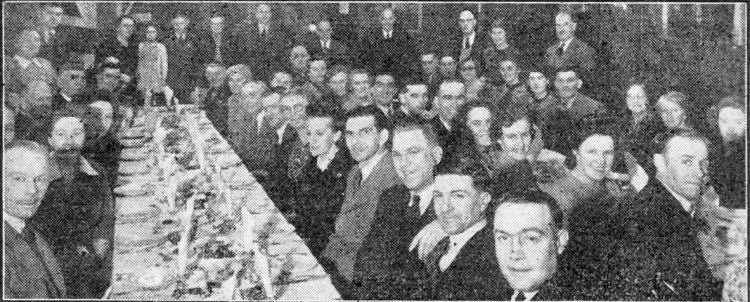
"CRICKETERS'" SUPPER
Fifty-four members and friends of the Men's and Ladies'
Darts Club of the "Cricketers Hotel" at a combined supper and social at
the hotel on Saturday. [Photo: Whorwell.]
|
|
From the Dover Express, 1951.
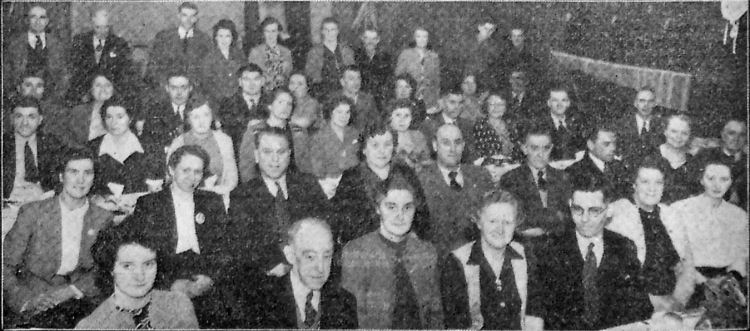
"CRICKETERS" SOCIAL
A group taken at the second annual supper and social on
Saturday evening when "The Cricketers" Darts Club entertained sixty
members and friends. [Kent Photo]
|
|
From the Dover Express, 15 February 1952.
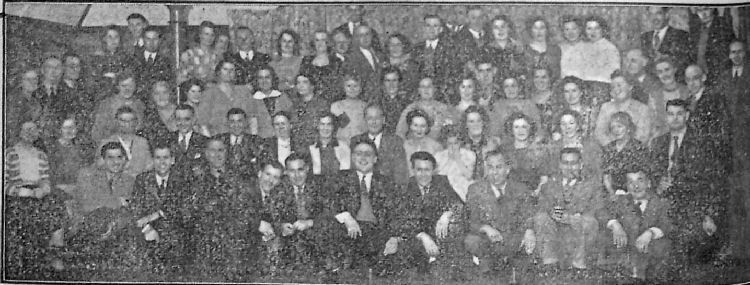
AT THE CRICKETERS
About seventy members and friends attended the annual
party of the Cricketers Hotel Dart Club on Saturday at the Hotel.
|
|
From the Dover Express, 14 September 2000.
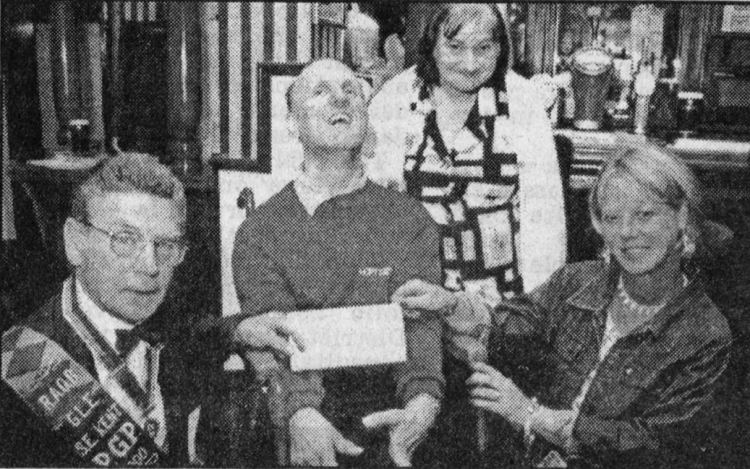
CHEQUE: Derek Dutton from the Pharos de Dubris hands over the money
to Christina Hunnisett from the Independent Living Scheme with Kevin
Downs and Ann Fagg.
Group raises cash, for a better life.
THE Independent Living Scheme (ILS) received a cheque for £750 at the
Cricketers' pub, River, on Saturday.
Derek Dutton handed it over on
behalf of the Pharos de Dubris lodge, Royal Antidiluvian Order of
Buffaloes.
Martin Willis will be doing a parachute jump on Thursday,
November 16 to raise more money for the group.
Donations can be
handed in at the Cricketers' pub.
The ILS help people with disabilities
coming out of institutions to live on their own.
|
|
From the Dover Mercury, 1 May 2003.
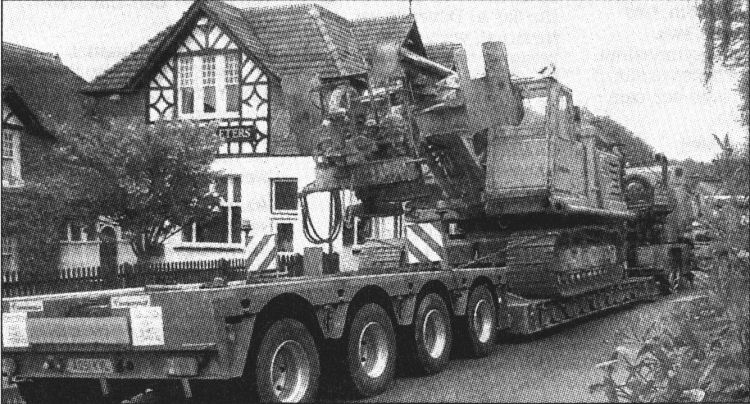
Badly rehearsed drill.
THIS 90-ton drilling rig caused quite a stir at River last Thursday.
It caught the eye of Mercury reader Fred Randell when it ground to a
halt near his home at Crabble Avenue.
The rig was being carried on a massive transporter and was accompanied
by the police.
"They brought it down Crabble Road and, with considerable difficulty,
managed to manoeuvre it round the bend into Crabble
Avenue," said Mr Randell.
"Wherever it was going to it didn't get there
and they had to drive the whole thing in reverse all the way down the
hill, Crabble Avenue, and, again with much difficulty and in reverse,
negotiate the bend back on to Crabble Road.
"Traffic was piling up and the locals got quite excited."
The rig is pictured outside The Cricketers before negotiating the bend
for the second time.
|
|
From the Dover Express 1 March 2007. By Phil Reilly.
Tear-gas attack hits footie fans after game.
DRINKERS at a packed pub in River were attacked
with tear gas on Saturday in what police believe was an assault by a
football hooligan.
About 100 people spilled out of the Cricketers pub and on to Crabble
Avenue at 6.30pm after the bar had filled with noxious CS gas.
The customers were mostly Dover Athletic and Dartford fans drinking
after the earlier game between the two sides.
The gas left people
coughing and vomiting in the street. Police are still unsure exactly how
it was released.
Whites fan Andy Stevens said supporters of both teams
were watching the England v Ireland Six Nations rugby match when the gas
was released.
Mr Stevens said: "Suddenly everyone started choking and
there was a mass exodus from the pub. You could feel it in the back of
your throat and stinging your eyes.
"Outside, a lot of people were bent
over spitting it up, I couldn't tell you what it tastes like but it was
horrible.
"I don't know whether someone threw something in through the
door or a window or whether it came from inside. The rumour at first was
that it was mustard gas but I think we'd all be dead if that was the
case."
Whites chairman Jim Parmenter branded the attack a terrorist act.
He said: "We had no problems at the game whatsoever and we do not know
for sure the attack was by supporters of either side.
"The CS gas
incident is an act of terrorism and should be treated as such."
The
Dartford team bus was also attacked after the game. One yob threw a
brick through one of its windows. A police spokesman said they believed
both attacks were connected to the match.
He said: "This was a very
unusual attack. We don't know for sure that it was CS gas but it seems
likely that it was."
Nobody was seriously injured in either incident.
Police are investigating and would like anyone with any information to
call 01304240055.
|
|
From the Dover Mercury 1 March 2007. By Mary Graham
Drinkers flee pub tear gas attack.
PEOPLE enjoying a Saturday evening drink were forced to flee from a
pub when tear gas was let off in the bar.
The incident happened just
after 6pm in the Cricketers Pub, in Crabble Avenue, River. At the time,
the pub was packed with Dover Athletic and Dartford fans, following the
match at Crabble, which ended in a 2-2 draw.
Around 6.15pm, police
received reports that a CS gas canister had been let off inside the pub.
Whites fan Andy Stevens, who was in the pub at the time, said:
"No one really knows what happened.
"One minute everything was peaceful
and people were watching the England-Ireland rugby match, then suddenly
the air got thick and everyone ran outside.
"Many people were coughing
and spluttering.
"It was unnerving and the incident could have been a
lot worse if there were children in the pub or people who suffer from
asthma."
The Cricketers landlord and landlady, Graham and Ann Bodell, said nobody
was hurt.
Police spokesman Jon Green, said reports of CS gas being
released were received at around 6.15pm.
He added: "An investigation has
been launched and at this stage it is too early to say whether a Dover
or a Dartford fan, or even a football supporter, is responsible.
"It has
also not been confirmed that the gas is definitely CS gas, but it is
clear that some noxious gas was released.
"The pub was quite busy after the Dover game and when police arrived
there were lots of people outside coughing and complaining that their
eyes were stinging."
An ambulance attended and fire crews from Dover
were called to check the gas had dissipated.
Police also confirmed they
are investigating criminal damage to the Dartford team bus, which had a
window smashed.
Police are appealing for any witnesses to the gas
attack to call them on 01304 240055.
|
|
From the Dover Mercury, 18 December, 2008. 60p
TALENTED ACTS TAKE TO THE MIKE
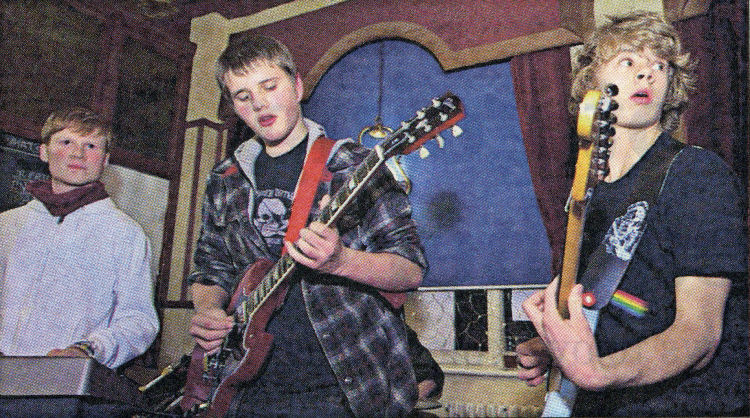
Rocking: Dover band Phallus was among the acts performing at The
Cricketers pub in River.
TALENTED local performers got the chance to show what they can do at
the Christmas open mic night at The "Cricketers" in River.
Bands, comedians and singers were among acts who performed in front
of an audience which included a talent scout from London.
Acts included young Dover singer Louise Orfila and bands Disturbing
The Peace, Hey Rudy and Phallus.
Organiser Laura Bodell said: “The next Cricketers open mic night will
take place on January 4 at 7.30pm.
“If you are a performer who would like to take part then please
contact me on 01304 206396.”
|
|
From the Dover Express, 22 January, 2009
Talent night
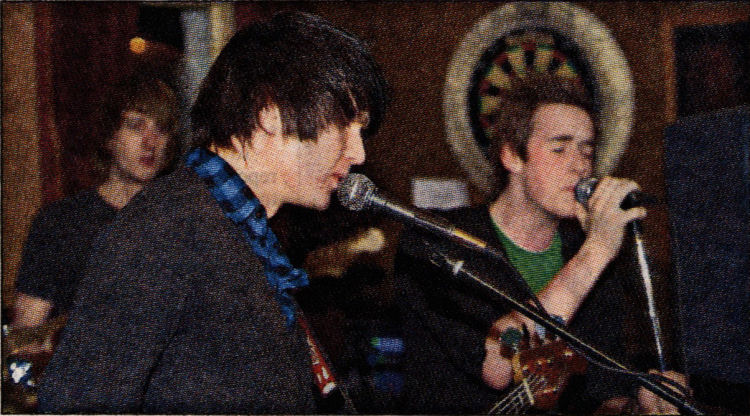
A HOST of local talent was on show at the latest open mic night at
The Cricketers in River.
Among the acts was 12-year-old Deal drummer Kieran Gaffney, featured
in the Express last week, who is due to go before the judges in TV show
Britain's Got Talent.
Also performing at the show on January 4 were comedians Julian Deane
and James Abbott, bands Carvel and One Below Scum, and singer/songwriter
Louise Orfila.
The next open mic at the pub is on February 1. The entertainment will
get started at 6pm.
|
|
From the Dover Express, 26 March, 2009. Advertising
feature.
Barbecues and birthdays to sports and seminars
The aptly named family-friendly Cricketers pub in River, near Dover,
has been an important community focal point for more than 100 years.
It is opposite the Crabble cricket and rugby pitches and home to the
Dover football club.
Over the years the pub has developed a reputation for warm and
friendly hospitality and offers convivial surroundings for regulars and
visitors to enjoy a relaxing drink or a pleasant meal.
With one of the largest gardens in the area, the pub has extensive
facilities for children and families. These include a play area with
swings, a bouncy castle in the summer, extensive lawns, a patio and a
covered barbecue area. Weather permitting, barbecues are held every
Sunday and if you want to hold your own outdoor party at other times,
there are a number of barbecue menus to choose from.
The Cricketers plays host to numerous sports teams and the sports
facilities available include two full-size skittle alleys, dart board
and pool table. There is also a spacious function room upstairs, with
its own private staircase and bar. This room can cater for private
parties of up to 100 people for weddings, birthdays, anniversaries,
funeral wakes, children's or office parties and can also be used for
business seminars or training courses as there is a laser projector and
screen available.
Plenty of unrestricted on-street parking is available and the pub can
cater for whatever you need. Whether you just want iced water, tea,
coffee and biscuits or a full hot or cold buffet with vegetarian
options, there is something available to suit every taste, budget and
occasion.
If you would like more details pop along to the Cricketers, Crabble
Avenue, River, Dover, call 01304 206396.
|
|
From the Dover Express, Thursday 11 November, 2010.
CLUB'S CHARITY SALE IN PUB
MEMBERS of Dover Rotaract Club are "setting up shop" in a pub to raise
money for the British Heart Foundation.
They will be selling clothes at bargain prices at "The Cricketers" public
house at River on Monday November 22 from 7pm until 9pm.
Entry to the sale is. £2 and all money raised will go to the charity.
The club says any donation of clothes for the sale should be taken to
the British Heart Foundation clothes shop in the town with a label
indicating it is for the
Rotaract Club's sale.
|
|
From the Dover Mercury, 2 February, 2012. 80p
CRICKETERS SET FOR A LONG INNINGS
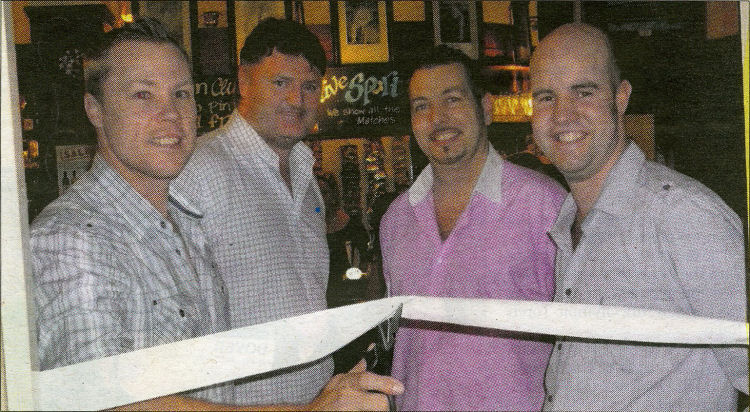
BOWLED OVER: Former Kent and England cricketers, from left, Martin
Saggers and Martin McCague at the reopening of The Cricketers pub in
Dover, with owners Keith Holbrook and Nathan Sutton, right.
LANDMARK Dover pub The "Cricketers" has been reopened for a fresh innings
by former Kent and England players Martin Saggers and Martin McCague.
The sportsmen cut the ribbon at the refurbished historic inn in Crabble
Avenue, River.
The pub first opened its doors in 1892. It was recently bought by the
"Funky Monkey" Leisure group which owns the Dover nightspot
"Funky Monkey"
in Bench Street. Landlord Nathan Sutton said: "I am delighted with the
refurbishment, it looks stunning. "We have been searching for some time
for a second pub in the area and we were
extremely pleased when the site became available. We are looking forward
to taking this iconic sporting pub further and continuing to develop the
family offering and fantastic pub garden."
The pub has two full-size skittle alleys, dartboard and pool table and
large gardens.
Archives recall that before The "Cricketers" was built, a tin hut stood on
the site used by the Total Abstinence Society. A plaque is still mounted
on the wall inside the pub.
In 1896, a syndicate consisting of Messrs Hayward, Finnis, Stillwell
and-brewer Alfred
C. Leney bought 14 acres of grazing land known as Crabble Meadows,
extending from the back of Bunkers Hill.
Eight acres to the north of the plot were steeply sloping. Levelling the
site to play cricket proved so expensive it nearly ruined the syndicate
but they did achieve their aim.
MP George Wyndham was able to open the ground on Whit Monday 1897.
The same year, Mr Leney applied for a licence for a house which his
company proposed to reconstruct at a provisional cost of £1,200. This is
the building that exists today.
|
|
From the Dover Express, Thursday, 9 February, 2012. 60p.
PUB REOPENED BY CRICKET DUO
RIVER: The Cricketers Pub in Dover, which dates from 1892, reopened
on January 26 after a major interior refurbishment.
Ex-Kent and England cricketers Martin Saggers and Martin McCague were on
hand to cut the ribbon to mark the event.
The pub was recently bought by the "Funky Monkey" Leisure group, which
also owns the "Funky Monkey" pub in Bench street.
Landlord Nathan Sutton said: “I am delighted with the refurbishment of
The Cricketers - it looks stunning.
“We have been searching for some time for a second pub in the area and
we were extremely pleased when the site became available. We are looking
forward to taking this iconic sporting pub further and continuing to
develop the family offering and fantastic pub garden.”
|
|
From the Dover Express, Thursday, 5 April, 2012. 60p.
DUO IN PUB GIG
DOVER: South Kent singer Louise Orfila will be performing in Dover
tomorrow as part of a new duo.
She will be joined by Kevin Iverson to sing as Canvas at The "Cricketers" in
River from 8.30pm. Entry is free.
|
|
From the Dover Mercury, 14 May, 2015.
Family fun day is fitting tribute to cancer victim.
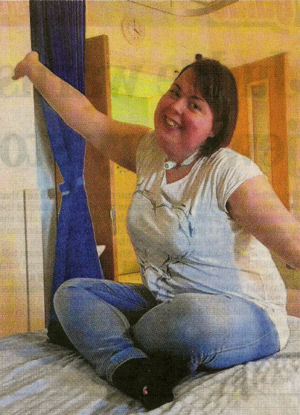
Zoe Martyn, who died from a rare form of bone cancer. A family fun day will raise funds for charity and remember the late Zoe
Martyn, who died from a rare form of cancer last year. Mrs Martyn, who was 23, lived in Valley Road in River. She died suddenly
on September 12 from chordoma cancer, just when it was thought she was
making good progress. It affects the bones of the base of the skull and spine - there is only
one case per million a year. On bank holiday Monday (May 25) a fundraising event will go ahead at The
Cricketers pub in Lower Road, River, to raise money for a charity that has
been set up in her memory. The Snowflake Foundation - For The Love Of Zoe - focuses on raising money
for three organisations. Proceeds go to Chordoma UK to fund essential research to find a cure, the
Pilgrims Hospice in Canterbury who cared for Mrs Martyn and to help
under-privileged young adults pursue a career in performing arts. Mrs Martyn aspired to be a dance teacher. The fun-day starts at 10am and finishes at 4pm. It will be made up of craft stalls, a barbecue, face painting and a bouncy
castle. There will also be a raffle. |
|
From the Dover Mercury, 3 September, 2015.
Pub’s music festival helps hospice funds.
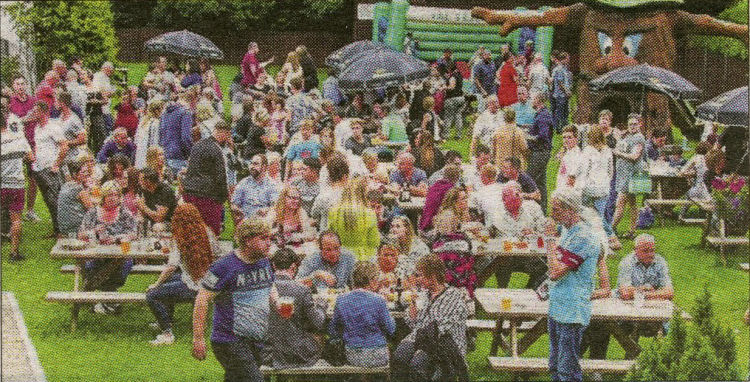
Crowds at Crickstock, hosted by The Cricketers, River.
More than £1,600 was raised for the Pilgrims Hospice in a pub festival on
Sunday.
It was the third annual Crickstock fundraiser hosted by The Cricketers in
Crabble Avenue, River.
About 400 people attended, enjoying the barbecue food, listening to bands
and taking part in a prize raffle.
Landlord Nathan Sutton said: “Many thanks to all the local friends and
businesses who donated prizes and, of course, all the bands who so
generously gave up their time to help us put the event on.
”It was such a wonderful day. The bands were fantastic and the crowd were
all getting into the swing, dancing and singing along. Now to start
planning for 2016.”
Entry was £3, with children admitted free.
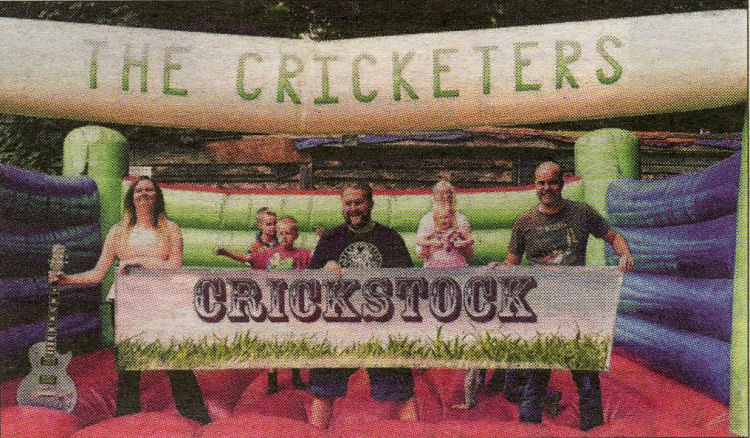
From left, Kayleiqh Swinney, Dan Burvill and Nathan Sutton.
|
|
From the Dover Mercury, 20 September, 2012. 80p
COMEDY NIGHT PLANNED FOR PUB
A COMEDY evening is being planned at The Cricketers pub in River on
Saturday, December 1.
Stand-up comedians Paul Ricketts and Sean McLoughlin, along with MC
Bobby Carroll, will be providing the entertainment for the event, which
will start at 8.30pm.
Tickets cost £8, including a buffet.
|
|
From the Dover Express, 7 July, 2016. By Lee Penfold
Raise a glass to our best boozer.
THE Cricketers has been voted “Dover’s Best Boozer” by Express readers.
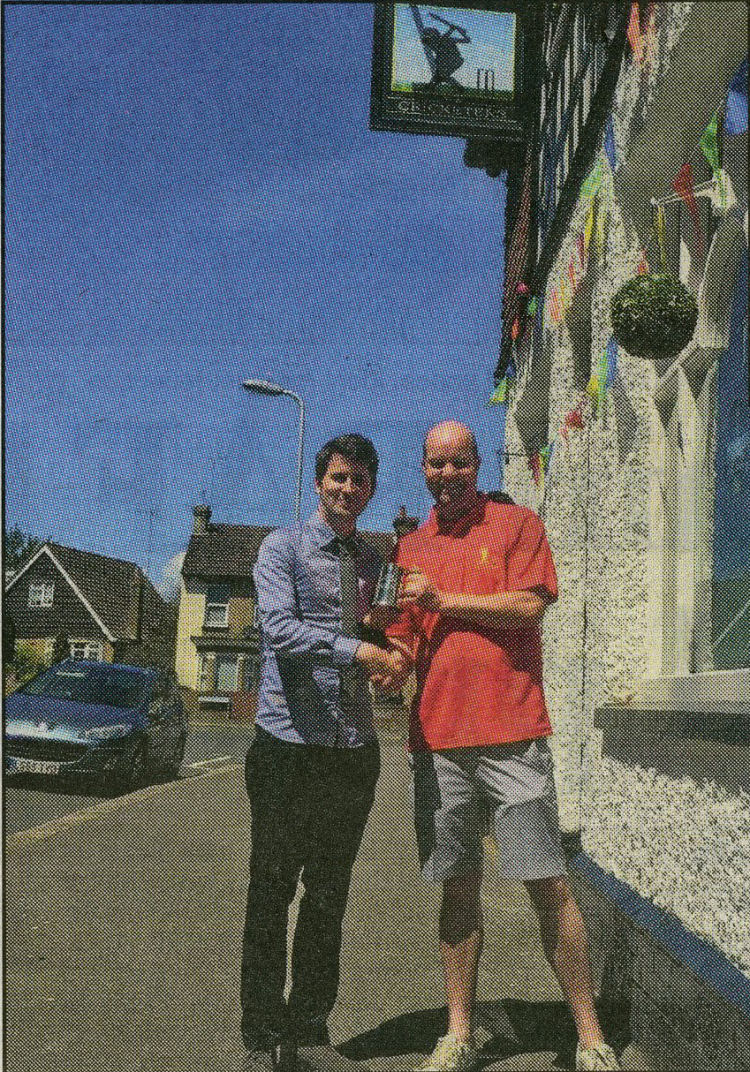
In our search to crown the top pub in the district we invited readers to
tell us their favourite in an online poll.
The "Cricketers," The "Red Lion," The
"Thirsty Scarecrow," The
"Eight Bells" and
The "Lanes" emerged as the top five.
But after a whopping 2,700 votes were cast, it was the allround,
family-friendly "Cricketers" in Crabble Avenue with its sprawling beer
garden that claimed the title.
On Monday the Express presented landlord Nathan Sutton with the
prestigious “Dover’s Best Boozer” tankard.
He said: “It’s fantastic to get recognition for all the hard work, for
the staff and for the customers.
“I have huge appreciation to everyone that’s supported us in the
campaign.”
Nathan and business partner Keith Holbrook will celebrate their
five-year anniversary of
running the pub on August 1.
The 38-year-old who lives with partner Kayleigh and sons Freddie 10, and
Henry 8, at The "Cricketers" said: “It’s just a pub that appeals to
everyone.
“I’m a great believer of the great British pub that represents all
sections of society “It becomes a social hub as opposed to just a retail
outlet.” The "Cricketers" has a golf society, a Sunday league football
team, two table tennis teams, skittle teams and a pool team - which
Nathan is a part of. Various groups and societies also use the function
room above the pub.
Regulars
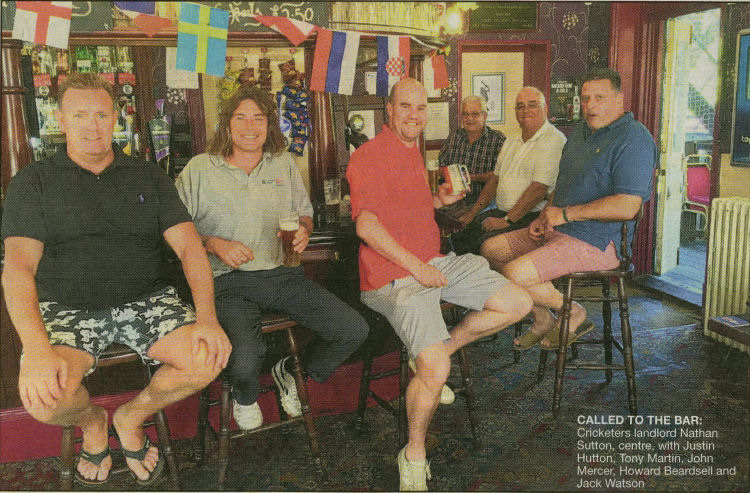
He said: “It’s got to be something to everyone.” Former Archers Court
pupil Nathan says the pub has its fair share of regulars - like Howard
Beardsell who ran The Cricketers from 1993-2004 and now manages The
Rugby Club clubhouse at Crabble Athletic Ground.
And there was the late Mick McCaffrey, a familiar face for around 30
years, who Nathan says was always at the heart of
anything going on in the pub. Mr McCaffrey died after a “long battle
with cancer”.
Nathan, 38, said: “There was a wake last Friday here. There’s now a
plaque out in the garden to him.”
The born and bred Dovorian says it will be “business as usual” for now.
New manager Martin Harris started at the pub last week. “Crickstock” the
pubs annual summer festival will be in aid of cancer sufferer Kelly
Turner this year and will feature local bands, children’s entertainment
and a cider festival.
Reflecting on his and Keith’s role as landlords of The "Cricketers" -
which is more than 100 years old - Nathan said: “We are just here to be
custodians for a few years.
“The customers will be here long after us.
“It’s their pub and we are here just to look after it.”
HOW YOU VOTED
Final figures for Dover’s Best Boozer after 2,736 votes
The "Cricketers": ' 33 per cent
The "Red Lion", Charlton Green: 21 per cent
The "Thirsty Scarecrow": 10 per cent
The "Lanes": 5 per cent
The "Eight Bells": 3 per cent
The rest of the votes were spread between other Dover boozers.
I’LL DRINK TO THAT.
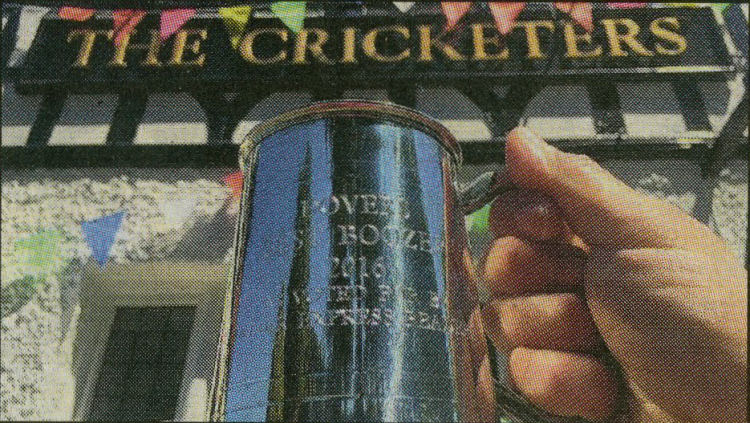
The Cricketers was built in 1887 but it was not until 1892 that it was
first used as a pub.
Before the Cricketers was built, a tin hut stood on the site which was
used by “The Total Abstinence Society”. The plaque bearing the name can
still be seen in the bar today.
In 1897, some steeply sloping grazing land known as “Crabble Meadows”
was levelled at great expense so that cricket could be played there and
it's thought that this is how the pub may have got its name.
Nathan says the cottage on the site pre-dates the pub by 100 years.
In its lifetime The Cricketers has also been called “The Cricketers
Inn”, “The Cricketers Hotel” and “The Cricketers Arms”.
Soldiers stationed in the area formed a very large portion of the
pub’s trade during the Second World War.
In 2007, following a football match between Dover and Dartford, the
bar filled with noxious CS gas after a tear
gas attack by a suspected football hooligan. Fans had to evacuate the
pub.
The Cricketers is traditionally the official pub for away fans. Nathan
said last year Bristol Rovers football fans got through 2,000 pints of
cider before 2pm.
The pub has had 25 licensees in its long history, the first being
George Thomas Edward Holley 1892-1899.
Many of the pubs original fixtures and fittings can still be seen,
including the gas pipes used for lighting six of the letting rooms when
it was “The Cricketers Hotel”. A “dumb waiter”, a small lift for
carrying things between the floors of a building, can also be seen
behind the bar.
Kent/England Cricket players Martin Saggers and Martin McCague were
there to re-open the pub in 2011 after a big refurbishment when Nathan
and Keith took over.
This list was compiled with the help of Nathan
Sutton and Paul Skelton of www.Dover-Kent.com
|
|
From the
https://www.kentonline.co.uk By Rebecca Tuffin, 24 August 2019.
13 Kent pub gardens to visit this summer bank holiday weekend.
With this bank holiday weekend set to one of hottest yet, many will
be longing for an ice-cold pint in a sunny beer garden.
So we have found some of the best Kent has to offer.
Listed below are 13 of the county's finest spots to meet with friends
and indulge in good food and drink.
The Cricketers.
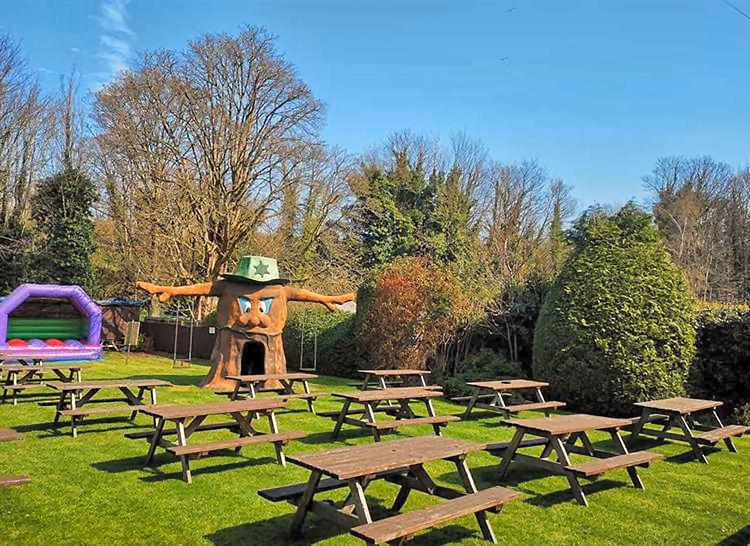
The Cricketers garden.
Aptly named, The Cricketers is opposite Crabble cricket and rugby
pitches, and has one of the largest beer gardens in the area.
Part of the community for more than 100 years, there is a bouncy castle,
pool table and a recently refurbished function room for hire.
The tavern hosted their annual Cricketstock festival last month, with
two days of live music, fancy dress and wild dancing.
|
|
From the
https://www.dailymail.co.uk By Raven Saunt, 9 June 2021.
Pub brawler bites his rival's EAR off and spits it onto the ground in savage
beer garden fist fight.
Assault took place at 7.40pm on May 30 at The Cricketers Pub in River, Dover.
A pub brawler was caught on camera biting off his rival's ear before
spitting it out onto the ground during a savage fist fight in a beer
garden.
Police are appealing for information about the assault that took place
at around 7.40pm on Sunday, May 30 at The Cricketers Pub in River,
Dover.
Shocking footage of the incident shows screaming pub goers desperately
trying to restrain the brawling pair.
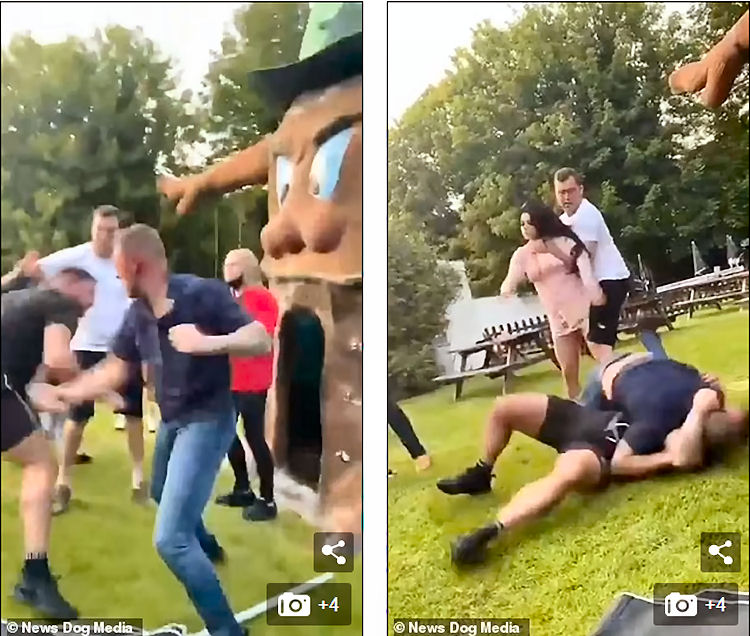
They punch and wrestle with one another before one onlooker shouts: 'Oh
my f***ing God! His ear's gone!'
A 39-year-old man from Dover has since been arrested on suspicion of
affray but was and released on bail while enquiries continue.
Police are appealing for information about the assault that took place
at around 7.40pm on Sunday, May 30 at The Cricketers Pub in River, Dover.
In the clip, recorded on the May Bank Holiday weekend, several screaming
drinkers attempt to restrain the two sparring men as they repeatedly
strike each other - but to no avail.
The men repeatedly hurl punches before they both fall and start
wrestling on the ground.
The brawler who is wearing black shorts gets his rival into a headlock
and savagely bites down on his ear.
A woman in high heels can be seen kicking him in a desperate bid to make
him stop before a bystander drags her away from the scene.
The man wearing shorts continues to gnaw on his rival's ear before
pulling his bloodied opponent up to his knees and pummelling his
stomach.
The sparring duo eventually get up to their feet and continue to throw
punches before the man in black shorts dramatically spits his rival's
entire ear onto the ground in front of stunned bystanders.
The group of onlookers scream and beg the pair to stop fighting as they
shout: 'Enough! Enough!'
The two bloodied men continue sparring before they are finally broken
apart by the other revellers.
The injured man who has had his ear ripped off walks away from the
scene.
It is not yet known why the brawl erupted between the two men.
But, according to a local social media report, it was originally
published on Facebook before being removed shortly afterwards.
A spokesperson for Kent Police said: 'Information is sought following a
serious assault near Dover.
'Kent Police was called to the rear garden of a pub in Crabble Avenue in
River following a report a man had been assaulted by another during an
altercation at around 7.40pm on Sunday 30 May 2021.
'The victim suffered a head injury which required hospital treatment.
'A 39-year-old man from Dover was arrested on suspicion of affray on 4
June and released on bail to 28 June while enquiries continue.
'Investigating detectives would like to thank those who have already
come forward with information, and are appealing for any witnesses who
have not yet spoken to an officer to contact Kent Police on 01843 222289
quoting 46/92609/21.
'You can also contact the independent charity Crimestoppers anonymously
by calling 0800 555111 or using the anonymous online form at
Crimestoppers-uk.org.'
|
|
From the Dover Express, 19 August 2021.
Police arrest second suspect in ear-biting bar-room brawl.
A SECOND arrest has been made in connection with a violent assault in
Dover in which it is believed a man's ear was bitten off.
Kent Police were called to The Cricketers pub in River following a
report a man had been assaulted at around 7.40pm on Sunday, May 30.
A video which surfaced several weeks ago shows two men fighting on the
floor. They get up and one of them spits something out.
Moments later a woman can be heard screaming: "Oh my f****** God! His
ear’s gone!"
It’s understood the two people involved were known to each other, and
that both have been permanently excluded from the premises.
On August 8, police arrested a
30-year old man from Dover on suspicion of assault. He has been released
on bail pending further inquiries.
The victim, a man in his 30s, suffered a head injury which required
hospital treatment.
A 38-year-old man was previously arrested in connection with the
incident on June 8, and remains under investigation.
Police say they would like to thank those who have already come forward
with information so far.
|
LICENSEE LIST
HOLLEY George Thomas Edward 1892-99
COLLINS George May/1898-1905
 ( ( Also wine and spirit merchant)
(age 56 in 1901
Also wine and spirit merchant)
(age 56 in 1901 ) )
  
SUMMERS Frederick William to Feb/1907 (To "Red Lion," St. Peter's)

HOBSON James Algernon Feb/1907-Nov/11 (Previous of Folkestone) (age 53 in
1911 ) )

WOOD George Nov/1911+

POWELL Frederick Richard 1912-1913+

LEWIS David 1916
TANNER Edwin Mark 1917
TASKER George Thomas  1920-Oct/23 1920-Oct/23
  
JONES R A (manager) 1924

SAUNDERS Joseph Alfred 1928-Apr/29


HUMPHREY Arthur Robert Apr/1929-Aug/40
     (Late Army instructor age 57 in 1939)
(Late Army instructor age 57 in 1939)
FULLAGER Arthur Edward Aug/1940 (Fremlins secretary)
BAMBRA Jonas M 1940-66

MOSELEY Jack 1966-73 dec'd
MOSELEY Mrs Rosa L 1973-76
 Fremlins
Fremlins
THOMPSON Julien 1977-80 end
HANDFORD Stephen 1981-83 end
WOODWARD Michael 1983
PRITCHETT Adrian 1987-88

HEMPENSTALL Christopher 1988
 ABBOTT Rick 1989-92
ABBOTT Rick 1989-92

BEARDSELL Howard 1993-2004
BODELL Graham 2004-09
ALLAN Michael 2009-Dec/11
SUTTON Nathan Jan/2012-22+
The Dover Express reported that George Wood was agent
for the brewers Messrs. Leney and Co.
 From Pikes Dover Blue Book 1899-1900 From Pikes Dover Blue Book 1899-1900
 From the Post Office Directory 1901 From the Post Office Directory 1901
 From the Kelly's Directory 1903 From the Kelly's Directory 1903
 From the Post Office Directory 1913 From the Post Office Directory 1913
 From the Post Office Directory 1922 From the Post Office Directory 1922
 From Pikes Dover Blue Book 1923 From Pikes Dover Blue Book 1923
 From Pikes Dover Blue Book 1924 From Pikes Dover Blue Book 1924
 From the Post Office Directory 1930 From the Post Office Directory 1930
 From Pikes Dover Blue Book 1932-33 From Pikes Dover Blue Book 1932-33
 From the Post Office Directory 1938 From the Post Office Directory 1938
 From Pikes Dover Blue Book 1938-39 From Pikes Dover Blue Book 1938-39
 From Pikes Dover Blue Book 1948-49 From Pikes Dover Blue Book 1948-49
 Library archives 1974 Library archives 1974
 From the Dover Express From the Dover Express
|









